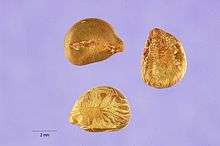Senna sophera
| Senna sophera | |
|---|---|
 | |
| Senna sophera seeds | |
| Scientific classification | |
| Kingdom: | Plantae |
| (unranked): | Angiosperms |
| (unranked): | Eudicots |
| (unranked): | Rosids |
| Order: | Fabales |
| Family: | Fabaceae |
| Subfamily: | Caesalpinioideae |
| Tribe: | Cassieae |
| Subtribe: | Cassiinae |
| Genus: | Senna |
| Species: | S. sophera |
| Binomial name | |
| Senna sophera (L.) Roxb | |
| Synonyms | |
|
Cassia sophera | |
Senna sophera is a shrub, glabrous, about 3 m. in height. The compound leaves with 8-12 paired leaflets acute and tapering; bear rachies with single gland at the base. It has yellow flowers in carymbose racemes.
Common names of Senna sophera include algarrobilla,[1] kasunda, baner. It was formerly called Cassia sophera in English. It is known as kasaundi in Hindi, and kolkasunda (কল্কাসুন্দা) in Bengali.
Possibly originating in Bangladesh,[2] today the plant is found in most tropical countries. It is common on waste lands, on roadsides and in the forests. Root bark in used for preparation of the medicine. It has been used by ancient Indian physicians for its efficacy in respiratory disorders.
References
- ↑ "Senna sophera". Natural Resources Conservation Service PLANTS Database. USDA. Retrieved 10 November 2015.
- ↑ Entry for Senna sophera (Linn) Roxb JSTOR Plant Science
External links
"Senna sophera". Integrated Taxonomic Information System. Retrieved 6 December 2010.